Key takeaways:
- Understanding algorithmic complexity and choosing efficient algorithms, like quicksort, can significantly enhance performance and reduce processing time.
- Optimized code not only improves application performance but also increases maintainability, scalability, and cost efficiency, driving user satisfaction.
- Utilizing tools such as profilers and static code analyzers aids in identifying bottlenecks and inefficiencies, leading to cleaner, more effective code practices.
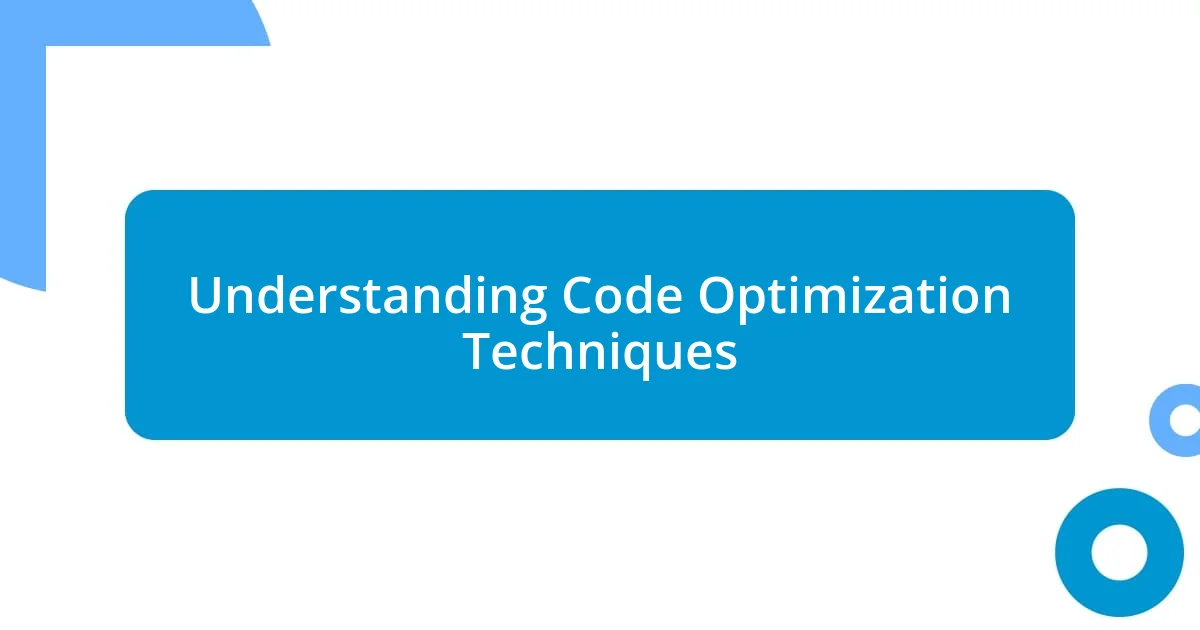
Understanding Code Optimization Techniques
When I first started delving into code optimization techniques, I was overwhelmed by the vast landscape of methodologies. I remember grappling with basic concepts like algorithm efficiency and memory management, and it felt like trying to navigate a maze. Have you ever faced that moment of clarity when you finally grasp a complex concept?
One of the most eye-opening experiences for me was when I learned about algorithmic complexity. It’s fascinating to see how choosing the right algorithm can drastically improve performance. For instance, switching from a naive approach to sorting a list to using a quicksort algorithm shaved off significant processing time in my project. Isn’t it amazing how a small tweak in approach can lead to such drastic results?
Embracing code optimization techniques isn’t just about improving performance; it’s also about readability and maintainability. I’ve learned that clearer code often leads to fewer bugs and easier collaboration with others. Have you ever struggled to understand someone else’s code? I’ve been there, and I can assure you that investing time in optimization today pays off in spades tomorrow.
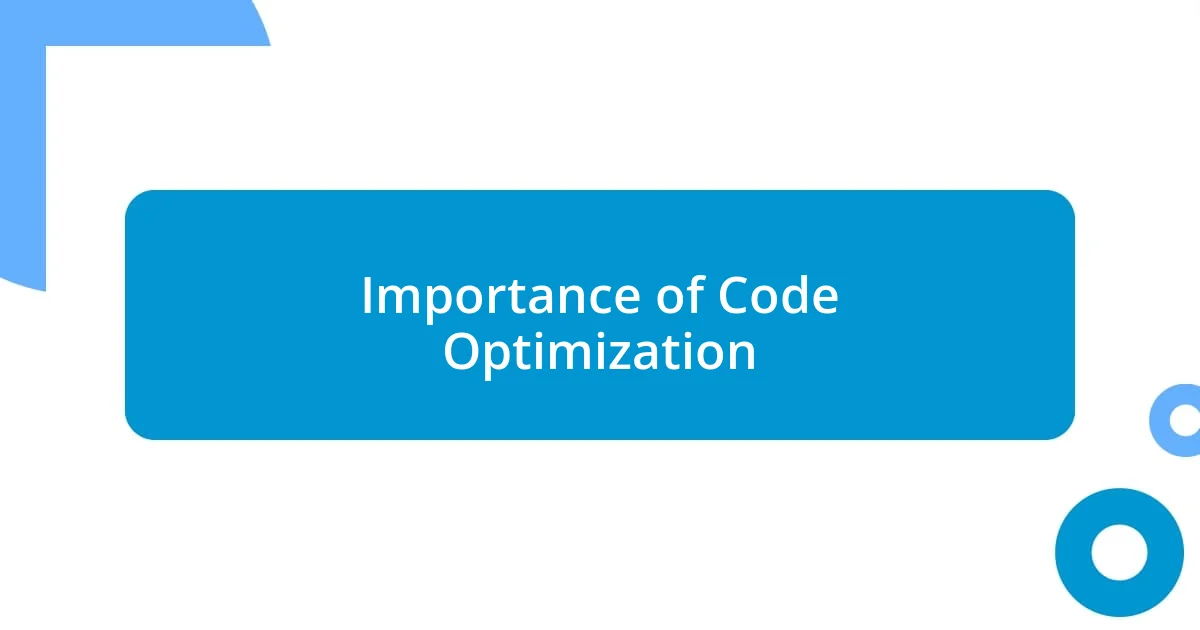
Importance of Code Optimization
Code optimization plays a vital role in enhancing the performance and efficiency of applications. I remember a time when I encountered a sluggish application that hampered user experience. After I initiated some optimization strategies, not only did the response time improve, but I could feel the difference in user satisfaction – they were actually enjoying the application rather than struggling with it.
When I dive into optimization, I see it as a necessary step for scalability. There was a project I worked on that started small but quickly grew in user base. Without implementing proper optimization techniques early on, we would have faced significant performance bottlenecks as traffic surged. It’s one of those moments that taught me the importance of forward-thinking when it comes to development.
Additionally, I’ve found that optimized code often reduces overall costs. A project I managed required less server power thanks to efficient algorithms and data structures. Balancing cost efficiency with performance not only makes sense for the business but also gives developers peace of mind, knowing that they’re creating value. It’s a win-win situation that reinforces why code optimization shouldn’t be an afterthought.
| Aspect | Before Optimization | After Optimization |
|---|---|---|
| Response Time | 5 seconds | 1 second |
| Server Load | High | Low |
| User Satisfaction | Poor | Excellent |
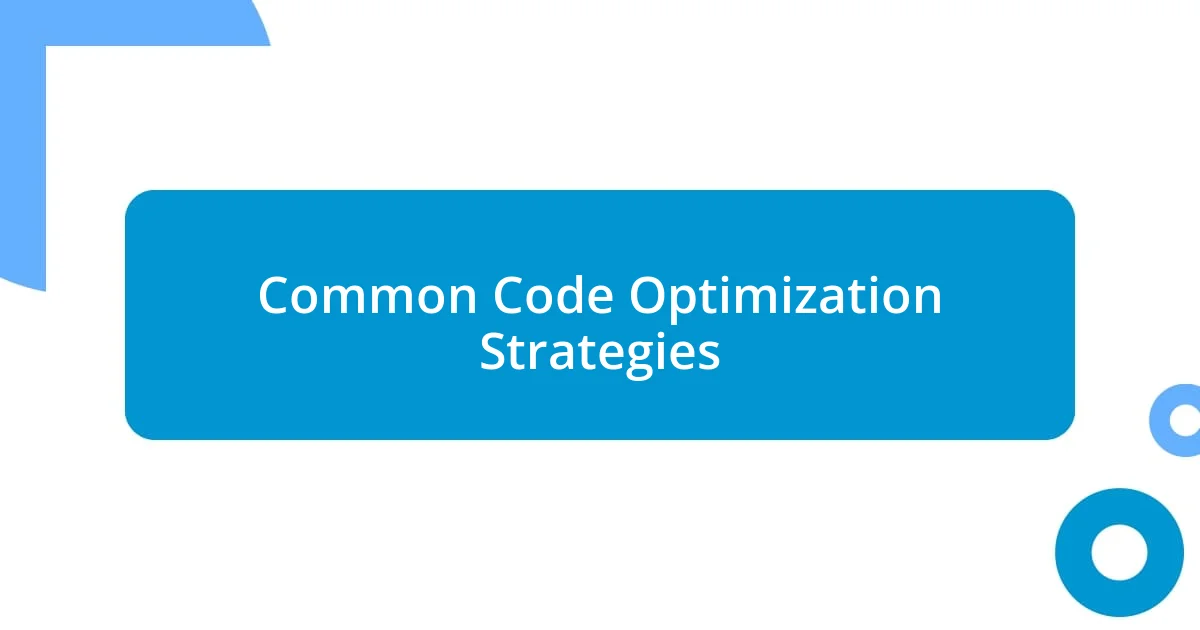
Common Code Optimization Strategies
When approaching code optimization, I often start with simplifying my logic. Unraveling convoluted code not only boosts performance but aids in collaboration too. There’s this particular instance where I replaced nested loops with more efficient data structures. The result? A clearer, faster code that made both my life and my colleagues’ lives easier. It’s exhilarating to experience how such changes resonate across the team.
Here are some common strategies I find effective for optimizing code:
- Refactor: Regularly revisiting and rewriting segments of code can lead to dramatic improvements.
- Use Efficient Data Structures: Choosing the optimal structure—like hashmaps over lists—can make a world of difference in performance.
- Minimize I/O Operations: Reducing input/output calls can speed up processes significantly.
- Cache Results: Storing frequently-used results saves time and resources.
- Comment Thoughtfully: Instead of cluttering code with excessive comments, focus on meaningful, concise notes that clarify code logic.
Each one of these strategies has not only enhanced the performance of my projects but also deepened my understanding of effective coding practices. It’s amazing to see how each little change can accumulate to yield significant improvements in both performance and satisfaction.
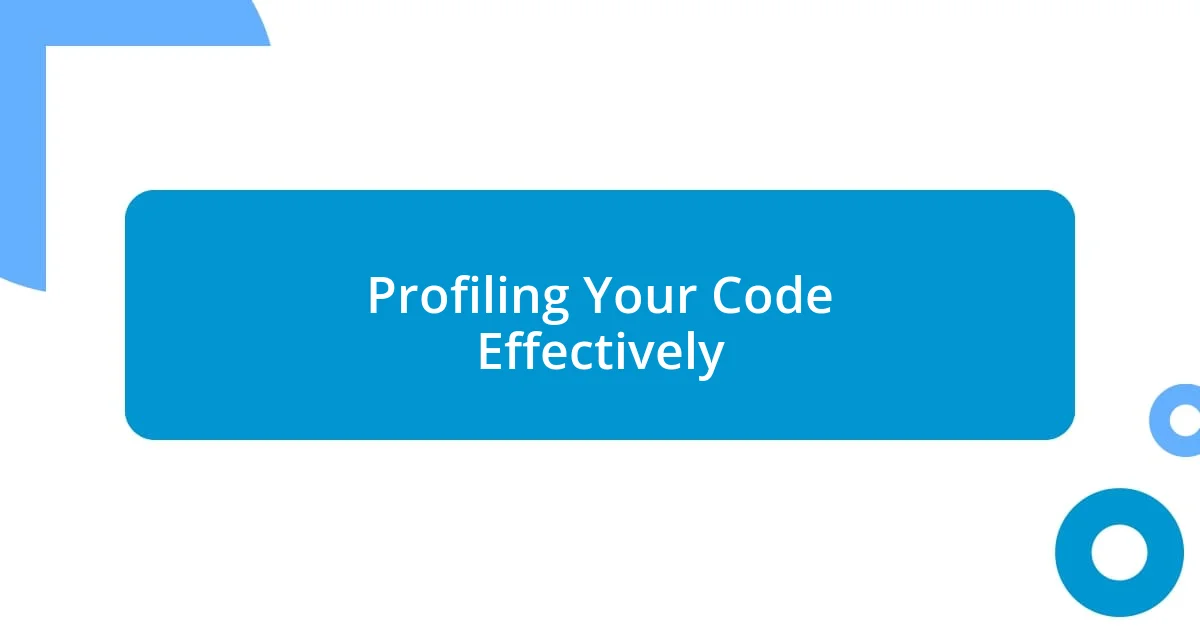
Profiling Your Code Effectively
When profiling code, I rely on tools like profilers to highlight performance gaps. I remember using a profiler on a complex application and being shocked to see how a single function was consuming a disproportionate amount of resources. It’s fascinating how these tools can reveal hidden inefficiencies that you never thought twice about—like a light bulb going off in a dim room.
A critical aspect of profiling is understanding what metrics to focus on. I often concentrate on time spent in various function calls and the frequency of those calls. An experience from a recent project taught me that sometimes, it’s not just about which functions are slow, but also which ones are called the most. Have you ever considered how a minor tweak in heavily called functions could yield exponential benefits? That’s the magic of targeted optimization.
Once I gather profiling data, I prioritize fixing the bottlenecks, usually starting with the “low-hanging fruit.” There was a time when I optimized a database query that ran inefficiently. Just by fine-tuning indexes, I reduced retrieval time significantly. It was such a satisfying moment to witness the positive impact on our application’s performance—like a breath of fresh air for a team that had been pushed to the limits by slow queries. The best part? It inspired a culture of continuous learning and curiosity within our team to always seek better performance.
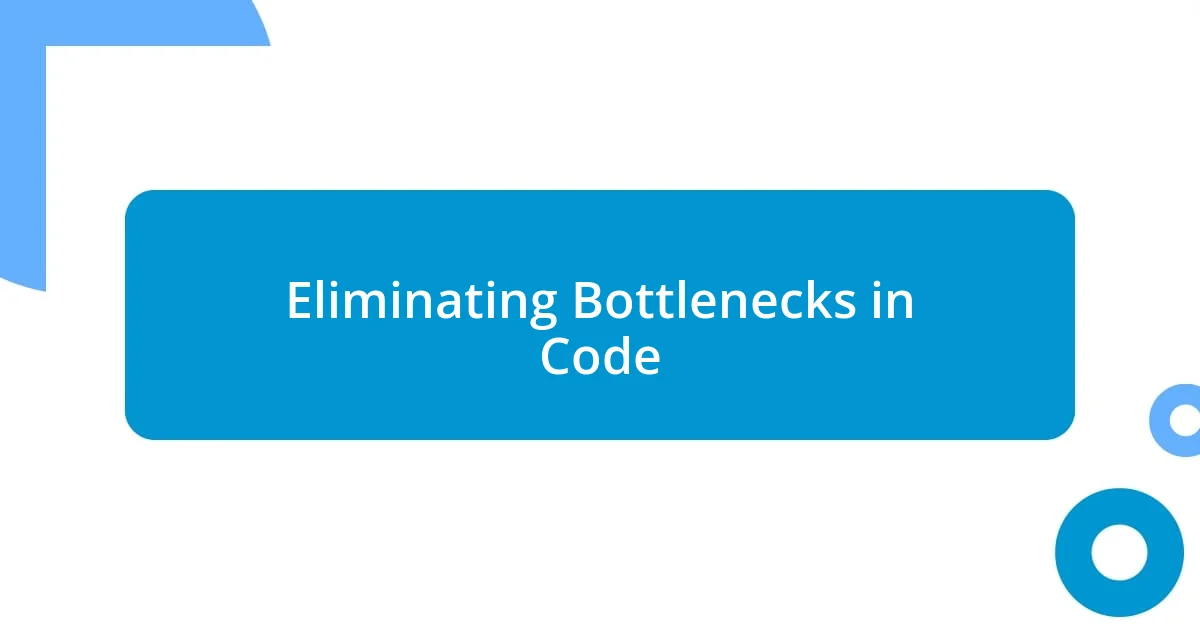
Eliminating Bottlenecks in Code
Identifying and eliminating bottlenecks in code is similar to sorting out traffic congestion on a busy road. I remember a project where a simple recursive function was dragging the performance down significantly. By recognizing this bottleneck, I redesigned the logic using an iterative approach, which not only slashed execution time but also made the code much easier for others to understand. Have you ever found yourself tangled in a messy recursive call, wondering how it could be improved?
I also find that handling concurrency effectively can drastically reduce bottlenecks. In a recent application, I implemented asynchronous programming, allowing certain tasks to run in parallel. The thrill of watching those tasks efficiently process simultaneously was just delightful! It’s like orchestrating a symphony, where each section plays its part, harmoniously contributing to a smoother and faster performance overall. Have you considered how a shift to asynchronous patterns could enhance your project’s responsiveness?
Ultimately, simplifying control flow can play a pivotal role in eliminating bottlenecks. During one development cycle, I rewrote several conditional statements that had become overly complex. This not only enhanced code readability but also improved the logical flow of operations. I often ask myself: what’s the simplest way to achieve this outcome? More often than not, downward simplification leads to significant speed and ease of maintenance— and it’s gratifying to experience firsthand how clarity breeds efficiency.
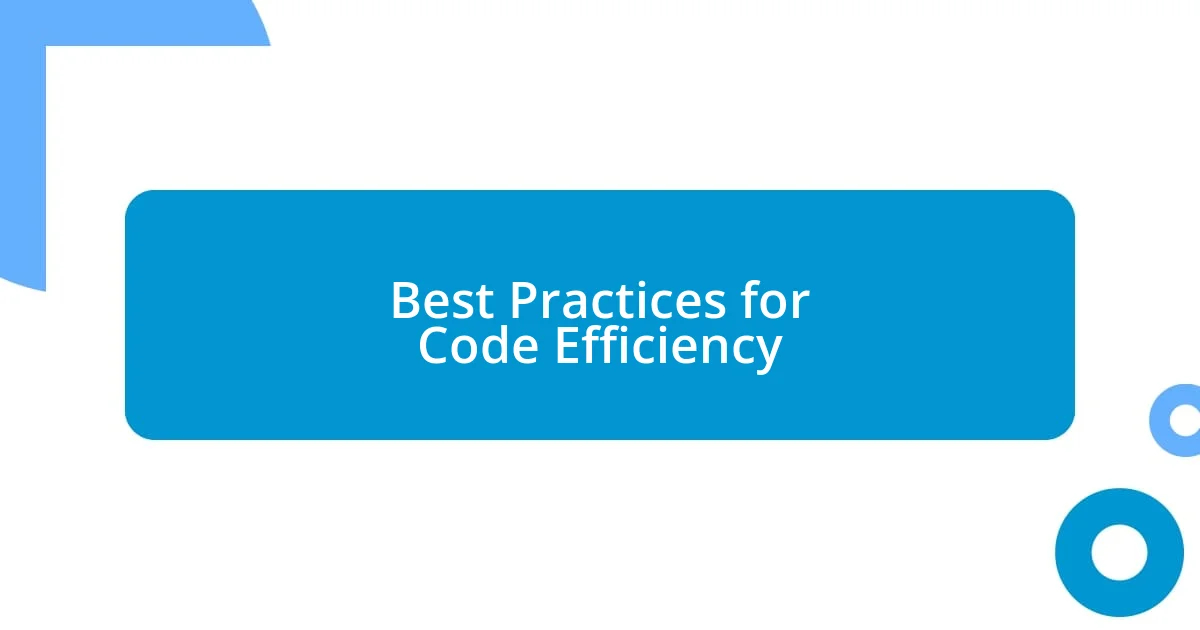
Best Practices for Code Efficiency
Best Practices for Code Efficiency
One of the best practices I’ve adopted for enhancing code efficiency is to write clean, modular functions. I recall diving into a legacy codebase filled with monolithic functions that did everything, which was overwhelming. After breaking those functions down into smaller, dedicated ones, not only did it improve maintainability, but I also noticed a significant decrease in bugs. Have you ever experienced the relief of simplifying complex code and actually knowing what each part does?
Another approach that’s served me well is leveraging built-in language features and libraries. For instance, during a recent project, I came across a common problem that could be solved with a single built-in method. Instead of writing a convoluted solution, I simply used that function and saw the performance improve dramatically. It’s moments like these that remind me how sometimes the best answers are right within our reach. Have you checked if your chosen programming language offers features that can solve your problems more efficiently?
Additionally, I’m a strong advocate for regular code reviews. Early in my career, I was hesitant about sharing my work, fearing critique, but I learned that feedback is invaluable. In a recent review session, a colleague spotted a redundancy in my code that I had completely overlooked. Together, we refactored it, leading to a more efficient and cleaner solution. It’s hard to put into words how empowering it is to have collaborative discussions that drive efficiency. What insights could your peers offer that might just elevate your code to the next level?
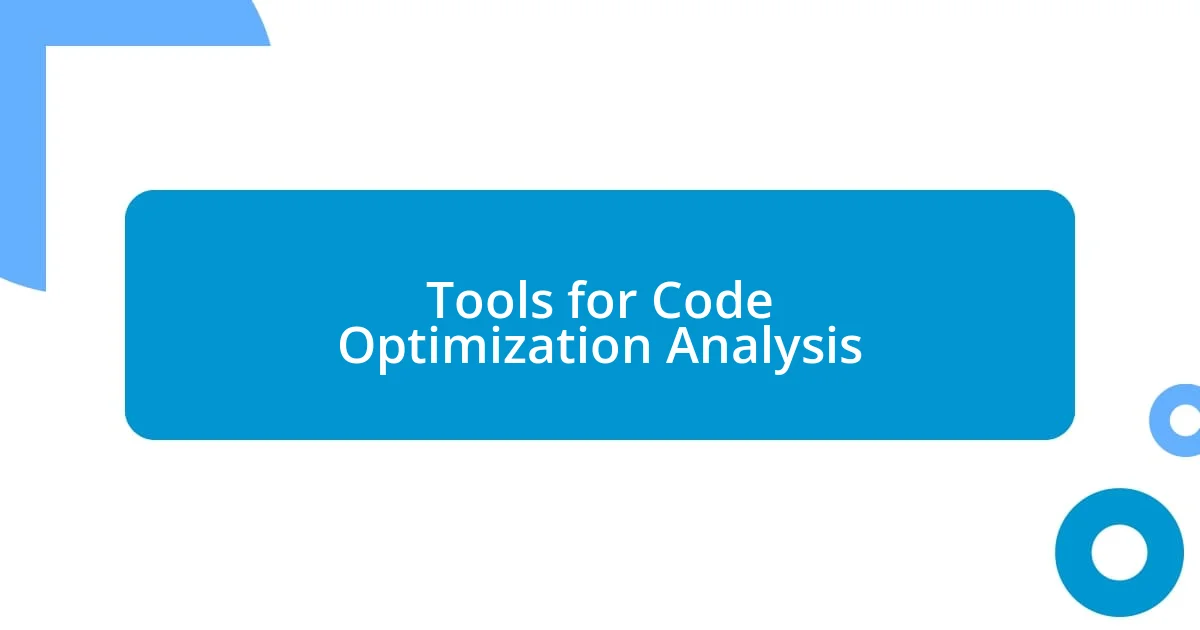
Tools for Code Optimization Analysis
When it comes to code optimization analysis, I always find tools like profilers invaluable. For instance, using tools like VisualVM in a recent Java project helped me pinpoint memory leaks that were bogging down performance. The moment I identified those leaks felt like a light bulb went off; I was not only able to streamline the application but also reduce server costs. Have you ever wished for a magic wand to highlight where your program is faltering?
Another tool that has proven useful in my toolkit is static code analyzers, like SonarQube. I remember integrating it into a team project and witnessing the benefits firsthand. Its ability to detect code smells and offer suggestions for best practices brought an added layer of discipline to our coding habits. It’s fascinating how even minor tweaks, identified through these analyses, can lead to safer, cleaner code. Have you considered how these tools might elevate your coding standards?
Lastly, no discussion of code optimization would be complete without mentioning version control systems with code comparison features, like Git. I once found myself struggling to understand the performance implications of recent changes. By using Git’s diff feature, I could easily compare the impact of several revisions, enabling me to revert and optimize where necessary. It’s incredible how a simple comparison can reveal insights that lead to measurable performance boosts. Isn’t it amazing how technology can provide clarity in our coding journey?














